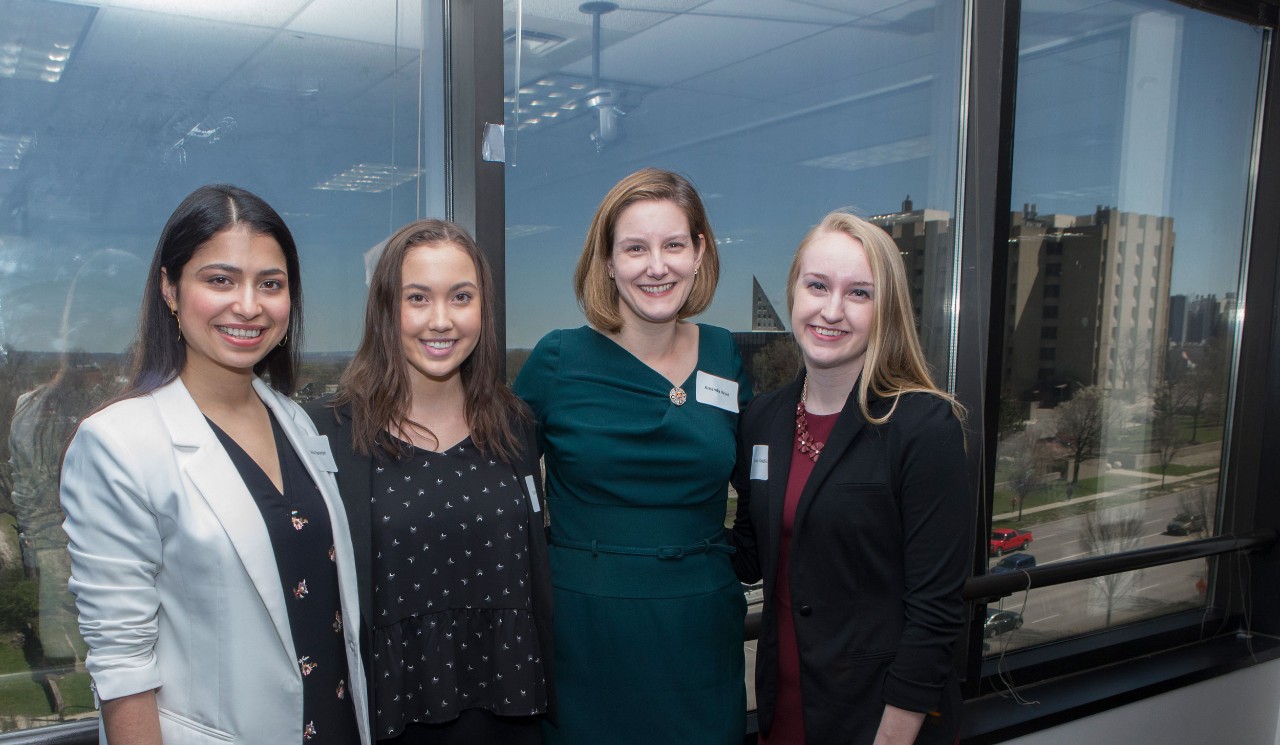
Amanda Wait, '00, creates pipeline of opportunity for women in economics
UC Foundation Trustee focuses on practical, problem-solving experiences for students
By Keith Stichtenoth
When University of Cincinnati alumna Amanda Wait found her life’s path, she was able to pursue it thanks to the support she got at UC. So she made a mental note to help others on a similar quest.
Today, Wait is one of the few female antitrust lawyers operating at a national level. She is also working to attract more women to pursue economics as a career path and getting firms to hire more women to solve big problems.
Twenty-two years ago, a 17-year-old junior came home from UC and excitedly told her parents that her professional destiny had become crystal clear. She was going to be an antitrust lawyer. They thought their daughter had lost her mind, but in reality, she had actually identified her calling. She flew through UC’s economics program, graduating summa cum laude in 2000, earned her law degree from William & Mary in Virginia, spent three years with the Federal Trade Commission, made partner at the Washington, D.C. office of an international law firm by 31.
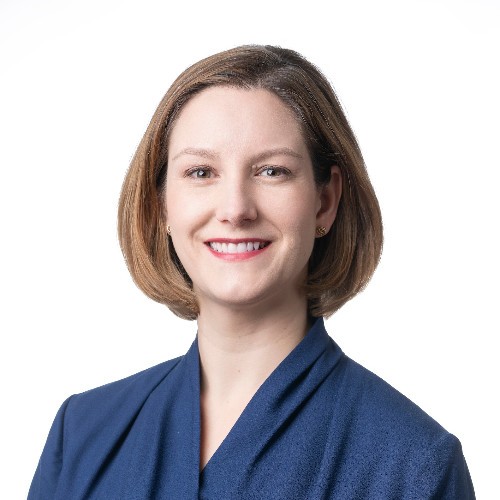
Amanda Wait, BA '00, is one of the few female antitrust lawyers operating at a national level and one of UC's most engaged and influential alumni.
Now, as a partner at Norton Rose Fulbright, Wait is recognized as both a star in her field and one of UC’s most engaged, passionate and influential alumni.
Her undergraduate experience was paramount in shaping Wait’s journey. Wait says her ongoing involvement with her alma mater compels her to share the wealth by supporting new generations of Bearcats, especially those studying in UC's Carl H. Lindner College of Business economics program.
“As an antitrust lawyer, I advocate to federal agencies to help client companies get mergers cleared through antitrust review,” Wait says.
She is frequently sought by national media for comment about mergers and other antitrust matters.
“We try to predict how companies will react to potential market changes resulting from the merger. It’s all based on economic theory and how companies compete, which goes back to lessons I learned in my Econ 101 and Industrial Organization classes. They provided the basic knowledge I still apply every day.”
Wait says she fondly remembers the way her academic family embraced and encouraged her during those critical three years she was an undergraduate. Starting college life as a commuter, she became a constant, inquisitive fixture in the Economics Department, which was then housed in UC's College of Arts and Sciences. With no dorm or apartment to circle back to during the day, Wait became well known to the faculty, who appreciated her drive and abilities.
I ask them, ‘What are you looking for? Why aren’t you hiring from UC?’
Amanda Wait, UC alumna on promoting UC economics graduates to employers
“I first got to know Amanda when she enrolled in my intermediate microeconomics class,” recalls Debashis Pal, PhD, David Sinton Professor of Economics and former economics department head.
“Her class project on product differentiation was so innovative that I still remember it. While presenting in class, she used a blind test between Coke and Pepsi to effectively make her point. Amanda was a brilliant kid with a maturity level way beyond her age. She is the most gifted student I’ve had in my 30-year teaching career.”
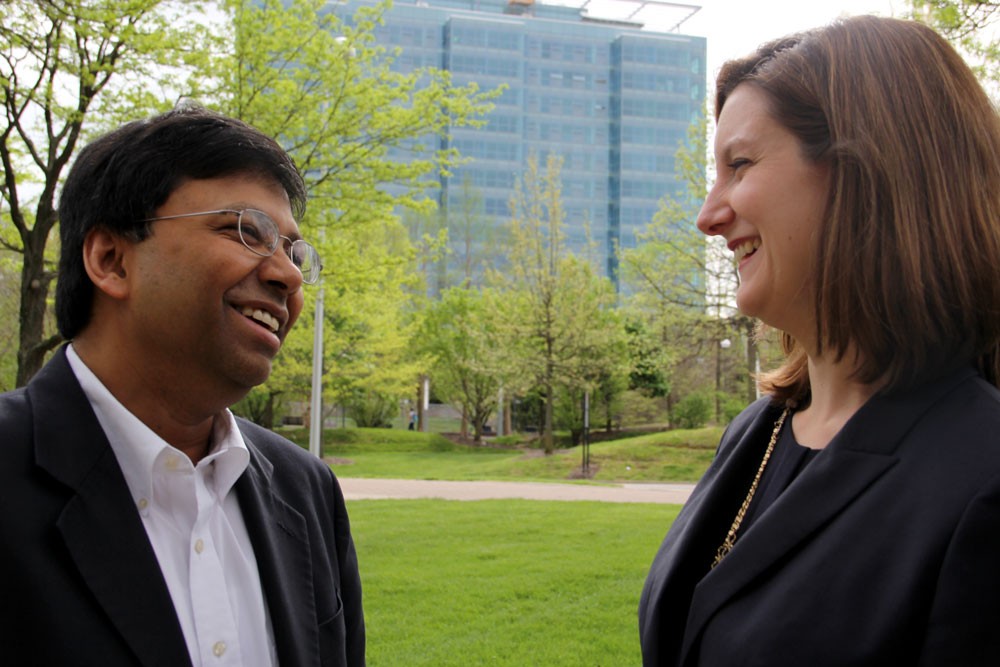
UC economics professor Debashis Pal, left, invited Amanda Wait, right, to speak at his department’s awards banquet in 2012. A subsequent conversation sparked deeper involvement for Wait.
UC’s sheer scale was far bigger than anything she’d encountered before, and the department became an anchor for the young prodigy, offering a sense of community and belonging. During her second year, while lending some informal help to UC professor Joe Gallo (now professor emeritus) for his paper on the efficiency of merger review by the U.S. Department of Justice, Wait had the proverbial “lightbulb moment” that clarified her life’s path.
“I realized there’s this whole world out there with people who analyze competition and mergers and how the economy works,” Wait says. “It just put all the pieces together for me. It was economics, it was law, it made sense, and I’ve never looked back.”
Expanding UC’s economics community
So according to Wait, you need to recognize your life’s path, but you also need the means to pursue the path.
UC's Economics Department provided that, too. Her ambition and academic credentials led to Wait’s selection as a Hewett-Kautz Fellow, now called the Kautz-Uible Fellowship, which provided full tuition and books for two years. That enabled her to take a heavy academic load each semester, graduate ahead of schedule with no debt and head to law school at 19.
She made And she made a mental note: when you can, help others on a similar quest.
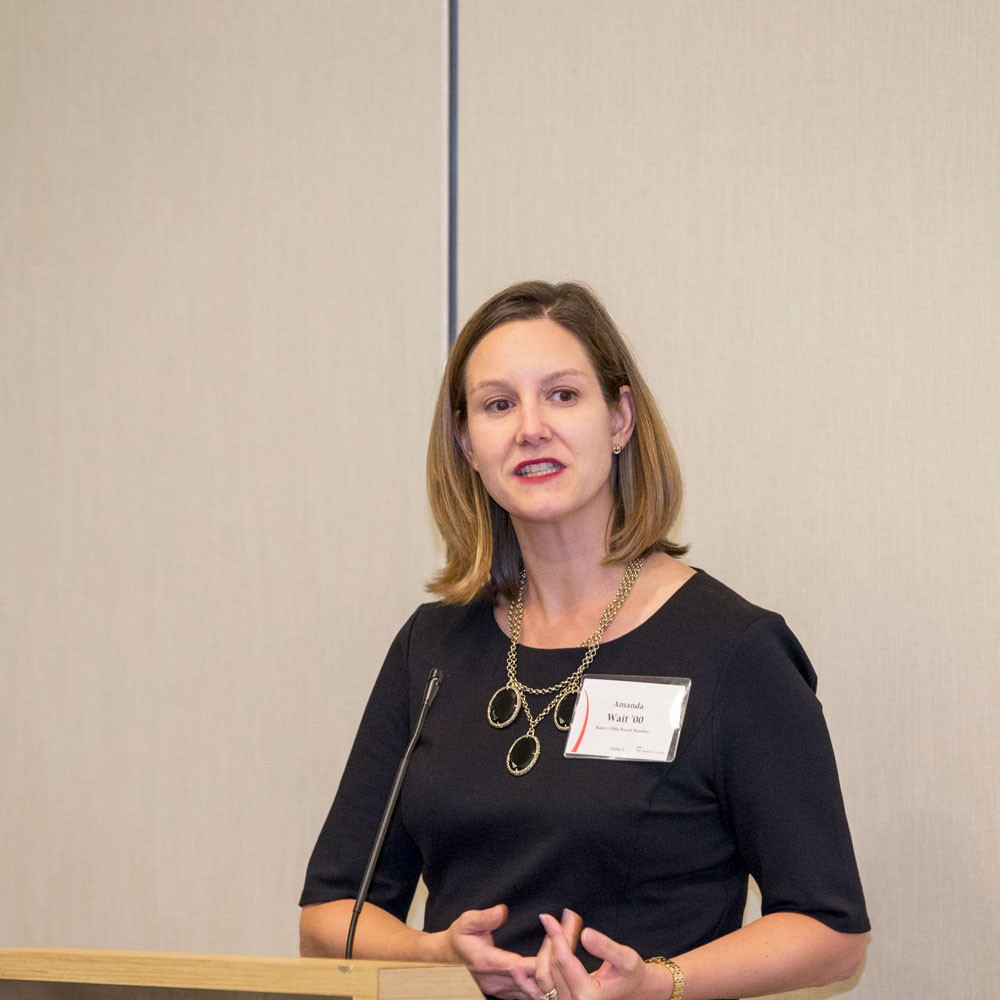
Amanda Wait speaks at a lecture hosted by the Kautz-Uible Economics Institute.
At first, her UC involvement as an alumna simply meant staying connected while her world was expanding with grad school, exciting work opportunities and creating a new life far from home. She credits the same sense of community that had first greeted her as an eager freshman. And in this case, “community” came largely in the form of keeping in touch with Pal. He invited her to speak at the department’s awards banquet in 2012.
A subsequent conversation touched on two related points. First, the department wanted to attract more students, as many high school seniors didn’t understand where an economics degree might take them.
“Economics provides the tools to kind of ‘order the world’ — to understand how it works in a number of different ways,” Wait says. “It can be at a macro level across economies around the world or a micro level figuring out how a company is going to react to a given situation.”
Second, while more women were studying economics at UC than when Wait had attended, the program still lagged in recruiting them compared to other business disciplines and programs at Lindner.
Economics provides the tools to kind of ‘order the world’ — to understand how it works in a number of different ways.
Amanda Wait, UC alumna
The opportunity to promote her discipline and provide targeted resources to help young women channel their inner Amanda Wait became irresistible. So she co-founded the Women in Economics (WIE) initiative within the Kautz-Uible Economics Institute. Mirroring the nearly 40-year-old institute, WIE seeks to advance Lindner’s economics program through scholarships for outstanding students as well as a host of networking and mentoring activities for both students and alumni. Mentoring circles have begun to spring up nationally — in Washington, D.C. and Chicago, with New York likely to follow soon. In addition to leading the initiative, Wait is funding three fellowships for female freshman and sophomore economics majors.
“I talk with all of the students in the Amanda Wait Fellowship program on a regular basis,” Wait says. “In fact, one had an internship scheduled in D.C. last summer and was going to stay in my guest room and live with my family, but her internship was done remotely because of COVID-19.
“The Women in Economics initiative has evolved into a multi-faceted group,” she continues. “We facilitate relationships among the Fellows and our alumni, and, twice a year, many of them gather to talk about their careers and where economics can take you.”
Growing the pipeline
Not many Bearcats are operating in the high-powered circles in which Wait moves, but she’s trying hard to change that. She recently assumed responsibility for her office’s hiring and, more importantly, has the ear of many economists and economic consulting firms with whom she works.
“I ask them, ‘What are you looking for? Why aren’t you hiring from UC?’ One thing our economics department has been doing really well through the Kautz-Uible Economics Institute is creating practical experiences for students — making sure they walk into their internships or full-time jobs ready to hit the ground running on ‘Day One.’”
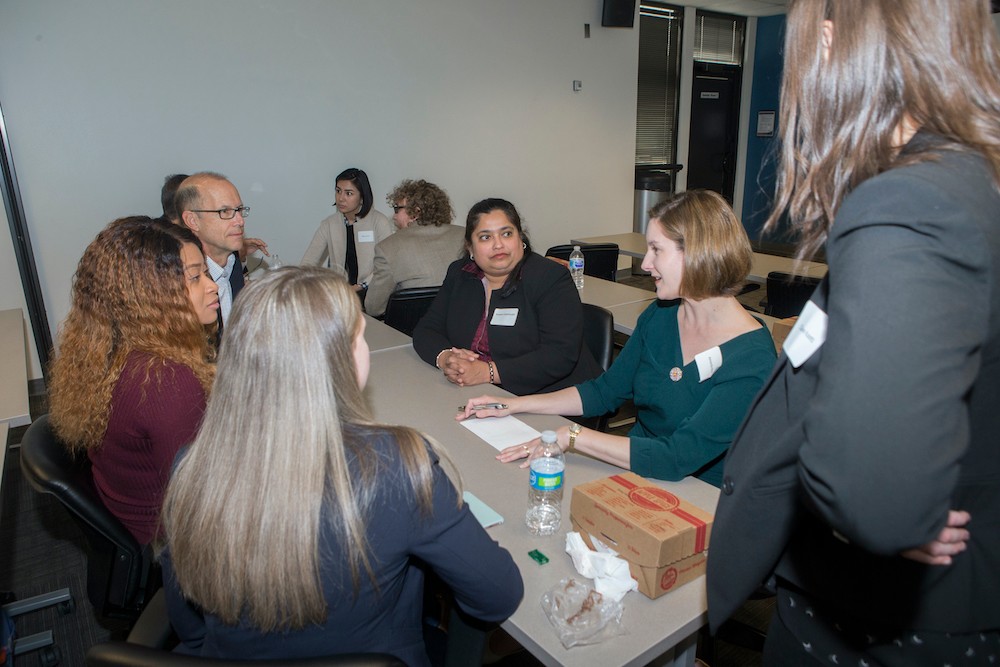
Wait, seen second from right, in conversation with a small group at a WIE event. Also pictured is Assistant Economics Professor Asawari Deshmukh (third from right) and Woody Uible (top, left).
To Wait, student success is tied to the fact that students involved with the Kautz-Uible Economics Institute are creating solutions to real-life problems.
“Companies and organizations come to the Institute for real economic and statistical analysis,” Wait says. “Our students can work there as research associates and interns, where they actually do the same type of work that an analyst at a consulting firm would do. So they come out with those real practical experiences and already are further ahead on the learning curve than students from more theoretical programs.
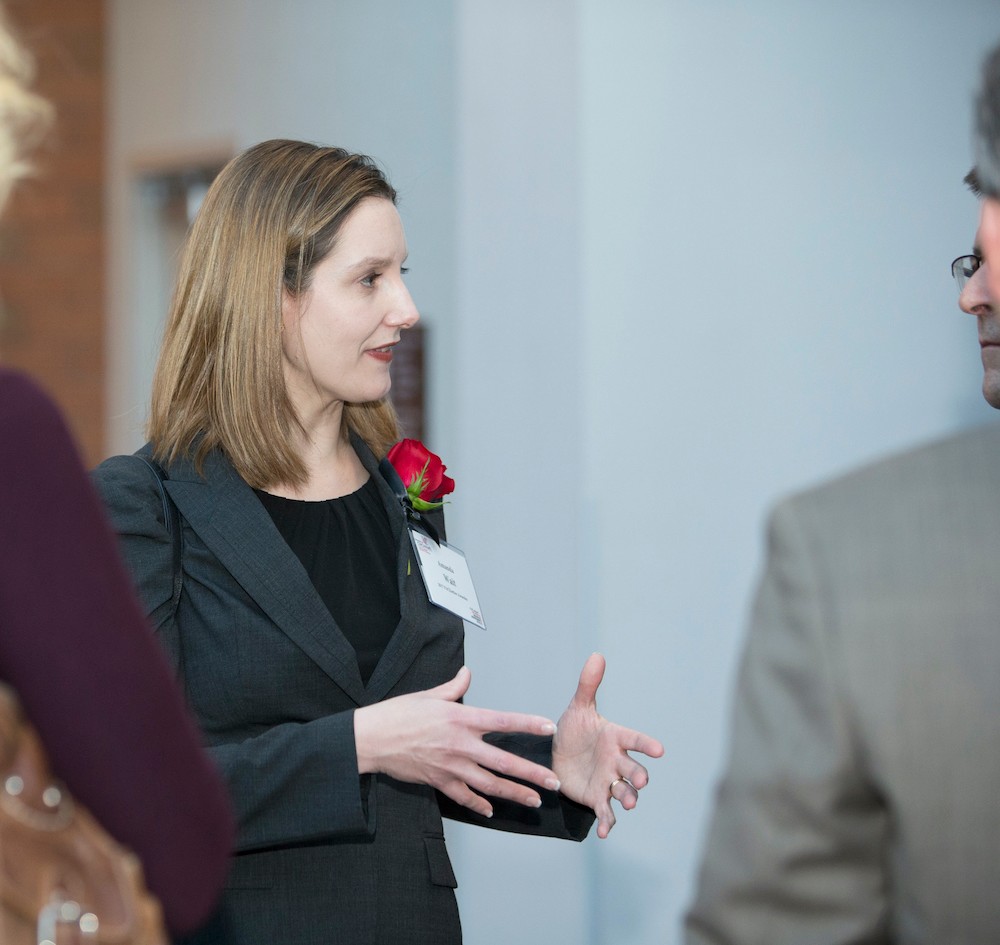
Wait at the 2017 Cincinnati Business Achievement Awards, at which she was honored with a PACEsetter award.
“Employers just need to open their eyes and go beyond where they have traditionally recruited,” she continues. “Once you get our fantastic Lindner students in the door, they’re ambassadors for our program and the college through their great work. If we can continue to bring students into these jobs and then have those students pull others along too, we create that pipeline of employment.”
Many UC volunteers and donors trace their investment to feelings of gratitude or obligation for what UC has done for them. While she can relate to that, Wait ascribes her deep involvement to that cherished sense of community; she treasures the relationships she has nurtured over the years and feels a kinship with other Bearcats who love the university and live its mission. From faculty members and administrators to fellow alumni volunteers and the students they all serve, it’s Wait’s second family, and she particularly looks up to the namesakes of the Kautz-Uible Economics Institute.
If we can continue to bring students into these jobs and then have those students pull others along too, we create that pipeline of employment.
Amanda Wait
“Jim Kautz, Dan Kautz and Woody Uible have had such an impact on the university, on Lindner, on the economics department, and on me personally,” she says. “I learned how to get involved and give back through Dan’s and Woody’s example. They are just 100% all-in Bearcats. They’re constantly thinking about how they can have an impact.”
And now, as a newly appointed trustee of the UC Foundation, the “family tree” is looking like a mighty oak — presumably the same one whose leaves in the official university seal represent permanence and learning. In her rapidly growing understanding of the breadth of UC’s power to transform lives, she finds herself actively thinking about how to leverage and enhance Lindner’s substantial problem-solving ethos while helping more and more people find and fulfill their destiny here.
“I have never met an alumna who is more committed to her alma mater than Amanda,” says Pal. “Through her vision, exceptional leadership and exemplary actions, she has created a sustainable camaraderie of women economics students and alumnae at UC. And I find it amazing that, in spite of her extremely demanding schedule, she always finds the time to assist our current students. She is truly special.”
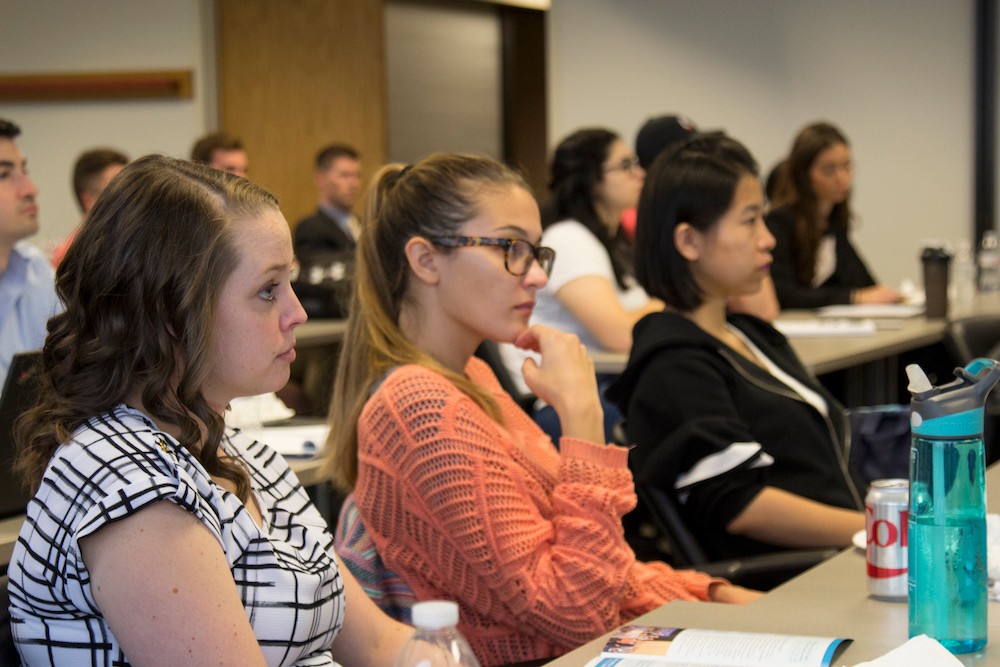
Student attendees at a National Association for Business Economics event. Thanks to Amanda Wait's involvement and passion, more women are choosing economics as their major at Lindner
Through it all, Wait feels she’s just being true to what bonded her to her department, college and university in the first place more than two decades ago.
“That sense of community has been really important to me; without the support they provide, I wouldn’t be where I am today,” she says. “I learn something from every student, every faculty member and everyone I work with in the UC family. This isn’t just me ‘giving back’ — I get something greater from my participation, and I learn things I never would have thought about.”
Featured Image: Amanda Wait (second from right) at a Women in Economics luncheon in spring 2018. Left to right: Aziza Lyons, BA '16, MS '17; Claire Koontz, BA '20; Amanda Wait, BA '00; Hayley Coldiron, BA, BBA '17, MS '18.
Who will you empower NEXT?
Scholarships, fellowships and enrichment programs provide opportunities for students to attend, grow and graduate from UC. You can empower our next leaders through support for scholarships and signature programs in career-based education, co-op or professional development. Learn more at nextnow.uc.edu.
Related Stories
CCM welcomes opera director and alumnus Jose Maria Condemi to...
May 5, 2025
UC College-Conservatory of Music Dean Pete Jutras has announced the appointment of Jose Maria Condemi, MFA, as CCM's new Associate Professor of Opera. His faculty appointment officially begins on Aug. 15, 2025. Condemi has been a director and producer of opera and theater of exceptional artistic quality for over two decades, both in the United States and internationally. His work encompasses a diverse range of styles and periods, consistently lauded for its theatrical sophistication, distinct visual sensibility and innovative approach.
The UC Alumni Association is now accepting nominations for its...
May 2, 2025
Each year, the UC Alumni Association recognizes and celebrates the many contributions and overall excellence of UC alumni in countless fields of endeavor, throughout the world. Next year’s slate of honorees will be recognized during Alumni Week, April 13-18, 2026 at the UC Alumni Celebration. The UC Alumni Association is currently accepting nominations for its top awards through July 16.
UC celebrates record spring class of 2025
May 2, 2025
UC recognized a record spring class of 2025 at commencement at Fifth Third Arena.